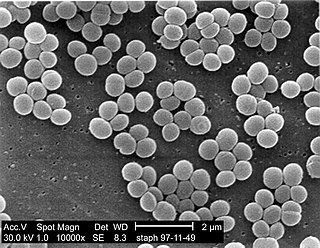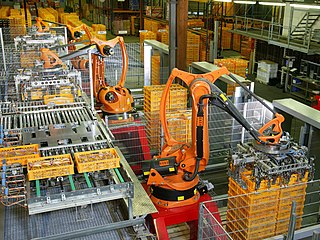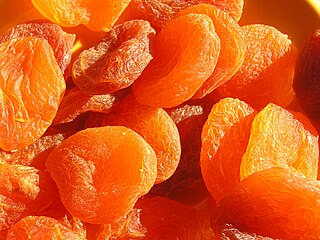
Cholera is an infection of the small intestine by some strains of the bacterium Vibrio cholerae. Symptoms may range from none, to mild, to severe. The classic symptom is large amounts of watery diarrhea that lasts a few days. Vomiting and muscle cramps may also occur. Diarrhea can be so severe that it leads within hours to severe dehydration and electrolyte imbalance. This may result in sunken eyes, cold skin, decreased skin elasticity, and wrinkling of the hands and feet. Dehydration can cause the skin to turn bluish. Symptoms start two hours to five days after exposure.

In physiology, dehydration is a deficit of total body water, with an accompanying disruption of metabolic processes. It occurs when free water loss exceeds free water intake, usually due to exercise, disease, or high environmental temperature. Mild dehydration can also be caused by immersion diuresis, which may increase risk of decompression sickness in divers.

Food drying is a method of food preservation in which food is dried. Drying inhibits the growth of bacteria, yeasts, and mold through the removal of water. Dehydration has been used widely for this purpose since ancient times; the earliest known practice is 12,000 B.C. by inhabitants of the modern Middle East and Asia regions. Water is traditionally removed through evaporation, although today electric food dehydrators or freeze-drying can be used to speed the drying process and ensure more consistent results.
Blanching is a cooking process wherein a food, usually a vegetable or fruit, is scalded in boiling water, removed after a brief, timed interval, and finally plunged into iced water or placed under cold running water to halt the cooking process. Blanching foods helps reduce quality loss over time. People often use blanching as a pre-treatment prior to freezing, drying, or canning—heating vegetables or fruits to inactivate enzymes, modify texture, remove the peel, and wilt tissue. Blanching is also utilized to preserve color, flavor, and nutritional value. The process has three stages: preheating, blanching, and cooling. The most common blanching methods for vegetables/fruits are hot water and steam, while cooling is either done using cold water or cool air. Other benefits of blanching include removing pesticide residues and decreasing microbial load. Drawbacks to the blanching process can include leaching of water-soluble and heat sensitive nutrients and the production of effluent.
Windhexe is a grinding and dehydrating apparatus operated with compressed air typically used in waste reduction and food processing. The Windhexe was unveiled in 2002 and operates via compressed air injected into a conical chamber which tumbles material at high speeds causing simultaneous dehydration and disintegration. The limited application of the Windhexe is in waste reduction and in animal processing with more proposed uses being explored commercially.

Freeze drying, also known as lyophilisation or cryodesiccation, is a low temperature dehydration process which involves freezing the product, lowering pressure, then removing the ice by sublimation. This is in contrast to dehydration by most conventional methods that evaporate water using heat.

Staphylococcal enteritis is an inflammation that is usually caused by eating or drinking substances contaminated with staph enterotoxin. The toxin, not the bacterium, settles in the small intestine and causes inflammation and swelling. This in turn can cause abdominal pain, cramping, dehydration, diarrhea and fever.

Food engineering is a multidisciplinary field which combines microbiology, applied physical sciences, chemistry and engineering for food and related industries. Food engineering includes, but is not limited to, the application of agricultural engineering, mechanical engineering and chemical engineering principles to food materials. Food engineers provide the technological knowledge transfer essential to the cost-effective production and commercialization of food products and services. Physics, chemistry, and mathematics are fundamental to understanding and engineering products and operations in the food industry.

Oral rehydration therapy (ORT) is a type of fluid replacement used to prevent and treat dehydration, especially that due to diarrhea. It involves drinking water with modest amounts of sugar and salts, specifically sodium and potassium. Oral rehydration therapy can also be given by a nasogastric tube. Therapy should routinely include the use of zinc supplements. Use of oral rehydration therapy has been estimated to decrease the risk of death from diarrhea by up to 93%.
Fluid balance is an aspect of the homeostasis of organisms in which the amount of water in the organism needs to be controlled, via osmoregulation and behavior, such that the concentrations of electrolytes in the various body fluids are kept within healthy ranges. The core principle of fluid balance is that the amount of water lost from the body must equal the amount of water taken in; for example, in humans, the output must equal the input. Euvolemia is the state of normal body fluid volume, including blood volume, interstitial fluid volume, and intracellular fluid volume; hypovolemia and hypervolemia are imbalances. Water is necessary for all life on Earth. Humans can survive for 4 to 6 weeks without food but only for a few days without water.

Onion powder is dehydrated, ground onion that is commonly used as a seasoning. It is a common ingredient in seasoned salt and spice mixes, such as beau monde seasoning. Some varieties are prepared using toasted onion. White, yellow and red onions may be used. Onion powder is a commercially prepared food product that has several culinary uses. Onion powder can also be homemade.
Drying is a mass transfer process consisting of the removal of water or another solvent by evaporation from a solid, semi-solid or liquid. This process is often used as a final production step before selling or packaging products. To be considered "dried", the final product must be solid, in the form of a continuous sheet, long pieces, particles or powder. A source of heat and an agent to remove the vapor produced by the process are often involved. In bioproducts like food, grains, and pharmaceuticals like vaccines, the solvent to be removed is almost invariably water. Desiccation may be synonymous with drying or considered an extreme form of drying.

Disodium pyrophosphate or sodium acid pyrophosphate (SAPP) is an inorganic compound consisting of sodium cations and pyrophosphate anion. It is a white, water-soluble solid that serves as a buffering and chelating agent, with many applications in the food industry. When crystallised from water, it forms a hexahydrate, but it dehydrates above room temperature. Pyrophosphate is a polyvalent anion with a high affinity for polyvalent cations, e.g. Ca2+.

Jain Irrigation Systems, often known as Jain Irrigation, JISL, or simply Jains, is a multinational organisation based in Jalgaon, India. JISL employs over 11, 500 employees, and has 33 manufacturing plants. It develops, manufactures, supports and sells diversified products, including drip and sprinkler irrigation systems and its components, integrated irrigation automation systems, PVC and PE piping systems, plastic sheets, greenhouses, bio-fertilizers, solar power, solar water-heating systems, solar water pumps, turnkey biogas plants, and photovoltaic systems. JISL also processes dehydrated vegetables, concentrated and frozen fruits or pulp.

Backcountry camping food includes ingredients used to prepare food suitable for backcountry camping and backpacking. The foods differ substantially from the ingredients found in a typical home kitchen. The primary differences relate to campers' and backpackers' special needs for foods that have appropriate cooking time, perishability, weight, and nutritional content.

Cut flowers are flowers or flower buds that have been cut from the plant bearing it. It is usually removed from the plant for decorative use. Typical uses are in vase displays, wreaths and garlands. Many gardeners harvest their own cut flowers from domestic gardens, but there is a significant floral industry for cut flowers in most countries. The plants cropped vary by climate, culture and the level of wealth locally. Often the plants are raised specifically for the purpose, in field or glasshouse growing conditions. Cut flowers can also be harvested from the wild.
The drink industry produces drinks, in particular ready to drink products. Drink production can vary greatly depending on the product being made. ManufacturingDrinks.com explains that, "bottling facilities differ in the types of bottling lines they operate and the types of products they can run". Drinks may be canned or bottled, hot-fill or cold-fill, and natural or conventional. Innovations in the drink industry, catalysed by requests for non-alcoholic drinks, include: drink plants, drink processing, and drink packing.

Intermediate moisture foods (IMF) are shelf-stable products that have water activities of 0.6-0.84, with a moisture content ranging from 15% - 40% and are edible without rehydration. These food products are below the minimum water activity for most bacteria (0.90), but are susceptible to yeast and mold growth. Historically, ancient civilizations would produce IMF using methods such as sun drying, roasting over fire and adding salt to preserve food for winter months or when preparing for travel. Currently, this form of processing is achieved by using one of four methods: partial drying, osmotic drying using a humectant, dry infusion and by formulation. A variety of products are classified as IMF such as dried fruits, sugar added commodities, marshmallows, and pie fillings.














